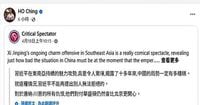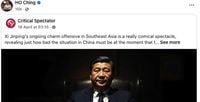As tensions between the United States and China escalate in the ongoing trade war, Chinese President Xi Jinping has embarked on a diplomatic tour of Southeast Asia, visiting Vietnam, Malaysia, and Cambodia. This trip comes at a time when criticism of his leadership style has reached new heights, particularly following a controversial commentary shared by Ho Ching, the wife of former Singaporean Prime Minister Lee Hsien Loong, on Facebook.
On April 21, 2025, Ho Ching, who previously served as the executive director of Temasek Holdings, forwarded an article that paints a stark picture of Xi Jinping’s governance over the past 12 years, labeling him as someone who has “always behaved like a gang boss.” This commentary, penned by Michael Petraeus, founder of the Singaporean platform Critical Spectator, argues that Xi’s approach has severely undermined China’s global influence.
The article, titled "If Xi Jinping Had Not Become a Gang Boss in the Past 12 Years, China Would Have Greater Influence in the World Now," was published on April 18, 2025. It opens with a scathing critique of Xi's recent charm offensive in Southeast Asia, suggesting that his attempts to win over neighboring countries, which have long been subjected to China's aggressive policies, are both laughable and indicative of China’s deteriorating position in the region.
Petraeus highlights the irony in Xi’s calls for “resisting confrontation” and “protecting multilateralism,” given that he has imposed the controversial “nine-dash line” in the South China Sea, which claims vast areas of maritime territory and has led to increased military tensions in the region. The article points out that Xi’s administration has built military facilities on disputed islands and has employed coast guard vessels to intimidate and harass fishing boats from neighboring countries.
Moreover, the commentary underscores a significant contradiction in Xi's rhetoric. While the Chinese Communist Party (CCP) publicly opposes protectionism, it simultaneously restricts many foreign companies from operating within its borders, violating commitments made when China joined the World Trade Organization (WTO). These commitments included pledges related to national subsidies, intellectual property rights, legal fairness, and the opening of markets to foreign entities. Yet, the CCP now criticizes other nations for engaging in protectionist practices, raising eyebrows and skepticism among international observers.
Petraeus draws a vivid comparison between Xi and Don Corleone, the infamous mafia boss from "The Godfather." He argues that Xi has consistently made “unrefusable offers” to other nations, employing coercive tactics to achieve his goals. Now, however, he seems to expect those countries, whom he previously pressured and suppressed, to embrace him as a partner. This expectation, the article argues, is unrealistic and poorly timed.
The commentary also touches on the contentious Belt and Road Initiative, which has faced significant skepticism in Southeast Asia. Critics have labeled many of its projects as “debt traps,” asserting that they serve to undermine local industries by flooding markets with low-priced Chinese goods, ultimately leading to economic collapse in the host countries.
Additionally, the article notes that Xi Jinping’s recent overtures towards Europe are undermined by China’s support for Russia amid the ongoing conflict in Ukraine. This support is perceived as a direct challenge to Western nations, further complicating Xi’s efforts to foster international partnerships.
Despite the negative perceptions surrounding Xi’s leadership, Petraeus contrasts him with former U.S. President Donald Trump, who, although often criticized, was seen as willing to engage in agreements with various countries. The article points out that the United States is generally trusted to honor its commitments, while China has developed a reputation for treating its partners unfairly. This long-standing pattern of behavior has led to deep-seated distrust among nations that have been on the receiving end of China’s aggressive foreign policy.
In light of these challenges, independent commentator Tsai Shenkun weighed in on the implications of Ho Ching’s decision to share Petraeus’s article. He questioned whether her actions were a careless oversight or a deliberate critique, considering Temasek’s substantial investments in China. Tsai speculated that Ho might possess insider knowledge about Xi’s diplomatic failures, suggesting that the Chinese leader could bear responsibility for the current diplomatic strife.
The commentary concludes with a sobering reflection on the CCP's approach over the past decade. It suggests that the regime's confrontational stance has irrevocably damaged its international credibility. Even if Xi now seeks to alter his diplomatic posture, reversing the widespread distrust that has developed will prove to be a formidable challenge.
As Xi Jinping continues his tour of Southeast Asia, the question remains: will regional countries respond positively to his overtures, or will they remain wary of a leader whose past actions have left them feeling vulnerable?





